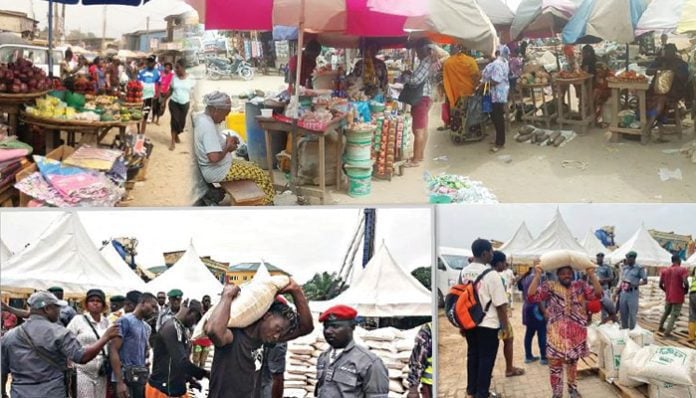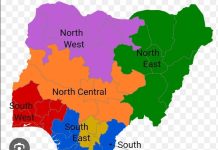

GODFREY GEORGE writes on the impact of the worsening economy and the rising prices of food and important items on the underprivileged
Six mouths, excluding hers, are what a petty trader and single mother, Comfort Soso, has to feed every day. She wakes up early every morning before the rest of her family, buried in her thoughts.
Her husband, whom she said had been married to her for over 24 years, left the house shortly after the birth of her last child, Anchor, and had since not returned.
“Many said he (my husband) was with another younger woman in Cross River State. Some said he travelled abroad but, since March 2019, I have not set my eyes on him,” she said, looking forlorn.
For years, the couple had been having some issues over unfaithfulness. Comfort had alleged that her husband was cheating. The husband, our correspondent learnt, lamented to several sources that his wife did not respect him and was used to insulting him because he did not have enough money to take care of the family.
A family friend, who said he only wanted to be identified as Eze and connected our correspondent to Comfort, said he had known them for over 15 years.
He said Comfort was a tailor when she got married but had to stop the job at her husband’s orders as he wanted her to concentrate on taking care of the family.
“I can tell you that life for this family has been a living hell. She has five biological children. Her first child, Gab, was from her previous relationship before she entered the marriage. Her husband was aware. It is just sad that things turned out this way,” he added.
Comfort, further speaking, said in her first year of marriage, she used to have a lot of issues with her husband, ranging from emotional to physical abuse.
She also alleged that the man was fond of absconding from responsibility.
“When I had my first child, he left home for months. When he came back, the child had almost stopped breastfeeding. We go through a lot.
“This period where the price of food is at its highest, you cannot imagine what I am going through as a single mother.
“My business has closed. What I call business was a food store people contributed money for me to open. We kept on eating out of the capital for the business until it folded up.
“My first child, who is around 21, still lives with me; he is a teacher in a private school. His salary is N24,000. His younger sister is a salesgirl with a clothing store and her salary is around N20,000.
“The other one is trying to start schooling. She just took the West African Senior School Certificate Examination last year. She recently got admitted to a polytechnic but there was no money to pay, so he had to forfeit the admission.
“The others are still in secondary school. I pay their fees. I pay for their transport. Life is just so difficult and there is really nothing I can do.
“The other day, Anchor (one of my children) was so sick that I thought he was going to die. I tried all I could but I couldn’t afford the medications needed. I tried the local (herbal) option and it made matters worse. His system was not used to it,” she lamented.
Comfort further said her family members consumed half a container of rice now worth around N3,500 at one go.
“We buy a ‘paint’ of rice now at around N7,000 or N7,500. All of us, at one go, can finish half a ‘paint’ of rice. If we don’t finish it, then the next time we are to eat, it would just be the last three (children) who would manage the remaining.
“Garri, which used to be a saviour then, has also become really expensive. I bought a ‘paint’ of yellow garri for N3,000 the other day, but when I went back, the seller said it had increased to N3,500.
“If not for a good Samaritan at the market who paid the additional N500 for me, I would have returned empty-handed. Life is hard; the food crisis has made things even worse,” she added.
Like Comfort, like Aminat
Aminat Saheed, a single mother of four young children, left Lagos three months ago for her hometown in Osun State. She said she had to leave since her rent expired and she lost her business at the market where she sold peppers and tomatoes to a government take-over.
“One day, we were just selling when some task force members came and told us to vacate the premises in three days, hinting that the government wanted to use it for something else. We had been managing ourselves at the mini market and we only had to pay some levies from the local government. But, with the takeover, my family and I had to move back to Osun. My husband is still in Lagos; he comes once every month.
“He works as a labourer. Anywhere there was construction, he would go there, get a daily job, and just help do some mixing, heavy lifting, and all that for a fee. That is what he has been doing for years after he survived a motor accident that almost took his life.
“If I begin to narrate how we suffer in this period of hardship, you will begin to wonder why we have not died. My four children, most times, go a full day without any meal at all. They just drink water.
“The one that can beg will beg and see whatever they can eat. It is terrible for me as a mother watching my children beg but what will I do? The eldest is just 12; the last one will clock four in July.”
Hunger, pain, despair
Every morning, Aminat wakes up before dawn, her weary eyes heavy with exhaustion, and sets out in search of odd jobs to earn a meager income. From washing neighbours’ clothes to cleaning homes, she did whatever it took to make ends meet.
But despite her tireless efforts, the income was never enough to cover the basic needs of her family.
Her kids faced their own struggles in the face of poverty. They watched with wide eyes as their mother toiled tirelessly, her shoulders stooped with the weight of their collective burden. Hunger gnawed at their stomachs, and the constant fear of not having enough to eat loomed over their heads like a dark cloud.
As Aminat trudged through the dusty streets of Osogbo, her children trailed behind her, their small feet struggling to keep up with her pace. They knew better than to complain or ask for more, for they understood the gravity of their situation all too well. Instead, they silently endured, their innocence marred by the harsh realities of poverty.
Despite their tender years, Aminat said her children often had to forgo basic necessities to make ends meet.
She said, “The phone I am using to talk to you now belongs to my neighbour. She told me that a journalist wanted to talk to me, and I had to wait for her to return from work before I could do this interview. Is this life?”
Lagos slum kids
In the heart of Lagos, a tiny slum town in Ikosi, popularly known as Gbola, sat. Children there wore hunger on their faces. Undone hair, rough feet, and tattered clothes, the kids ran barefoot, their faces etched with the premature lines of hardship.
Yet, despite their struggles, they wore a happy smile, as they played in the scorching hot day, grinning from ear to ear.
When our correspondent arrived in the community with a few packs of noodles, the kids scampered around, having recognised our correspondent, who had been there a year before for a story.
A young girl, Toyo, whose eyes beamed with excitement, requested a pack of noodles. Soon, the crowd swelled so much that the noodles were barely enough to go round.
A mother, who did not give her name, said she cried every night before bed, and that every morning when she woke up and saw her children suffering, their once bright eyes grew dim with exhaustion, and their laughter faded into silence.
They longed for simple pleasures that other children took for granted – a full meal, a warm bed, a chance to play without worry.
As the weather became hotter and her daughter clung to her side, her tiny hands gripping hers tightly, the woman said the hardship and rising cost of food items were putting her family into deeper poverty.
While describing how hard life has been for her, she said, “I know we are poor. I used to sell in Alapere before. I have sold in Mile 12, too. But, somehow, I have found myself here. I just need the government to look at people like us in pity.
“The other day, I heard the Customs were sharing rice or something and we ran there to see how we could buy, but there was no road; everywhere was blocked. It is not our fault that we are poor. If we had our way, we would also want to be rich like everyone else but look at us.”
As she spoke, her daughter, who could barely talk began to cry, her eyes heavy with fear and despair, uncertain of where her next meal would come from.
The woman further lamented that noodles which used to be her go-to in times of lack had gone beyond her reach.
“How can a pack of noodles be sold at N500? We used to buy a cup of rice for N400 in 2021. How did things get this bad?” she queried.
She further lamented how the rising cost of living in Nigeria posed a formidable challenge to her efforts to provide for her children. Although she refused to talk more about the father of the kids, she said, “Their father is not here. He is also trying.”
Rising inflation
For months, the cost of goods and services has soared in the country, pushing prices of essential goods beyond the reach of ordinary citizens.
Basic commodities such as rice, beans, and cooking oil have become luxuries that people like Aminat cannot afford.
Many food sellers have lamented how their once bustling business centres have become deserted, their shelves near-empty.
A man who sold tomatoes and onions at the Magboro market, Ogun State, Mohammed Isah, said he recorded more losses in the last four months than he recorded in an entire year.
“Most of my tomatoes just get spoilt because who will buy them? It is getting worse by the day. I come out every day and just sit down here listening to music. The market does move the way I want it to, the way it is supposed to.
“The other day, I had to slash the prices of most of my goods so they would not spoil. I just sold them at the cost price so I would be able to go to the market and purchase another one. It is really crazy,” he said.
Some other food sellers at the market shared the same sentiments, lamenting that they had to use the profits made from the previous batch of goods bought to pay for the next batch because the prices of goods had continued to increase.
“Imagine buying a bag of beans for more than N100,000. Where are we going as a country?” a foodstuff seller, who did not give her name, asked when our correspondent approached her for an interview.
“I have children, too. I have a family. Despite my best efforts, my children sometimes go to bed hungry because there is nothing I can do.
“I cannot steal. If the market does not move, I will not steal. Most of the things you see here, I bought on credit. It is really tiring,” she lamented.
In December, Nigeria’s annual inflation rate rose to 28.92 per cent from 28.20 per cent in November, the National Bureau of Statistics said.
The statistics office said the December 2023 headline inflation rate showed an increase of 0.72 per cent points when compared to the November 2023 headline inflation rate.
The NBS said on a year-on-year basis, the headline inflation rate was 7.58 per cent points higher compared to the rate recorded in December 2022, which was 21.34 per cent.
“This shows that the headline inflation rate (year-on-year basis) increased in December 2023 when compared to the same month in the preceding year (i.e., December 2022),” it said.
Also, the bureau said on a month-on-month basis, the headline inflation rate in December 2023 was 2.29 per cent, which was 0.20 per cent higher than the rate recorded in November 2023 (2.09 per cent).
This, it said, meant that in December 2023, the rate of increase in the average price level was more than the rate of increase in the average price level in November 2023.
In recent years, food prices have been on the rise across Nigeria. The situation deteriorated due to the impact of government policies such as the removal of the fuel subsidy, amongst others.
President Bola Tinubu had, in July 2023, declared an immediate state of emergency on food insecurity to tackle the increase in food prices.
He also directed that “all matters pertaining to food and water availability and affordability, as essential livelihood items, be included within the purview of the National Security Council”.
Food inflation
The food inflation rate in December 2023 was 33.93 per cent on a year-on-year basis, which was 10.18 per cent points higher compared to the rate recorded in December 2022 (23.75 per cent).
The NBS said the rise in food inflation was caused by increases in prices of bread and cereals, oil and fat, potatoes, yam and other tubers, fish, meat, fruit, milk, cheese, and egg.
“On a month-on-month basis, the food inflation rate in December 2023 was 2.72 per cent, this was 0.30 per cent higher compared to the rate recorded in November 2023 (2.42 per cent),” it said.
It explained that the rise in food inflation on a month-on-month basis was caused by a rise in the rate of increase in the average prices of oil and fat, meat, bread and cereals, potatoes, yam and other tubers, fish and milk, cheese, and egg.
“The average annual rate of food inflation for the 12 months ending December 2023 over the previous 12-month average was 27.96 per cent, which was a 7.02 per cent points increase from the average annual rate of change recorded in December 2022 (20.94 per cent),” the report said.
Customs stampede
The sale of 25kg bags of rice by the Nigeria Customs Service to Lagos residents at a discounted price turned tragic in their office when seven people were reported killed while struggling to buy the confiscated rice being sold by the NCS to the public as an intervention in the current economic hardship and hunger.
The stampede was said to have occurred due to poor crowd management by the Customs, as hundreds of people tried to force themselves into the venue to buy the 25kg rice sold the price of N10,000 at the Customs zonal office on Harvey Road, Yaba, Lag, os on Friday, February 23.
Giving an account of his experience on TV360 Nigeria, a Lagos resident, Ahmed Isah, said when people were struggling to gain access to the Customs zonal office in Yaba, some who fell in the process were trampled on.
The father of six said two people died at the entrance gate while four were already lying on the floor when he eventually gained access to the zonal office.
“There were a lot of people who fell in the process and many fainted alongside with no one knowing their fate,” he said.
Consequently, the national public relations officer of the Customs, Abdullahi Maiwada, told journalists that the agency had put the sale of rice in Lagos, which was in its pilot phase, on hold.
The situation further underscored the level of poverty in Nigeria, with over 133 million multi-dimensionally poor people, according to official figures. Forty million households, according to the World Bank, are poor and lack access to several resources, including food and water. Many of these Nigerians were part of the many who trooped into the Customs facility to purchase the ‘cheap rice’ which led to the stampede.
Looting reigns
Two weeks ago, some youths were reported to have stolen food items from trucks stuck in traffic along the Kaduna Road in the Suleja area of Niger State.
On Sunday, hoodlums attacked a warehouse belonging to the Agricultural and Rural Development Secretariat of the Federal Capital Territory Administration located in the Dei-Dei area of the capital city and looted rice, grains, and other relief items.
But for the intervention of some soldiers, a private warehouse in the Idu Industrial Estate, Jabi, Abuja, would have suffered the same fate when a group of persons made an attempt to steal food items from the warehouse.
Although the Minister of State of the FCT, Dr Mariya Mahmoud, said the looting of the FCT agric secretariat on Sunday was not motivated by hunger, several experts said the hunger in the land was becoming unbearable.
Speaking during an assessment of the looted warehouse, according to a statement by the Special Adviser Media to the minister of state, Austin Elemue, on Monday, she said the FCT administration would reinforce security across all government-owned warehouses in the nation’s capital.
The development came as the police, through the spokesperson for the FCT Police Command, Josephine Adeh, in a statement Sunday night, said they arrested 15 suspects, including two local security guards employed by the warehouse management, in connection with the attack on the warehouse.
On Monday, hoodlums were reported to have attacked a truck conveying raw materials from the Dangote Cement Plant in Ibese along the Ofada-Owode area of Ogun State, at about 6 pm on Sunday.
A police source said the hoodlums, who were armed with guns and machetes, allegedly attacked the truck which was en route to Obajana in Kogi State.
It was further reported that the three occupants of the truck with registration number LSR 670 AS, including the driver, sustained varying degrees of injuries as a result of the attack. Confirming the incident on Monday, the state Police Public Relations Officer, Omolola Odutola, said the police in the Owode division had begun an investigation into the incident.
Similarly, the Kaduna State Police Command on Monday confirmed the looting of a food truck in Zaria on Saturday, adding, however, that no arrest had been made in connection with the incident.
The food truck was said to have been hijacked and looted by suspected hoodlums at Dogarawa in the Zaria area of Kaduna State, shortly after the driver parked it on the Zaria-Kano Expressway to observe his prayers.
In a video circulated on social media, a group of people were seen carting away cartons of spaghetti from the truck before a team of police officers was later deployed to the scene of the incident.
Reacting to the incident, the state Police Public Relations Officer, Mansir Hassan, explained that the command had deployed its men to protect road users in the area.
“There was no arrest yet but we have deployed our men to safeguard the lives and property of the vehicle and other motorists plying the road,” he added.
FG distributes grains
Perhaps, disturbed by the incidents, the Federal Government, on Wednesday, announced that it would distribute the 42,000 metric tonnes of grains approved by President Bola Tinubu to poor Nigerians at no cost.
This came as Ogun State Governor, Dapo Abiodun, also announced over N5bn intervention plans which he said would go a long way to help the residents of the state stay afloat under the biting effects of the country’s struggling economy occasioned by the rising inflation and currency devaluation.
Abiodun revealed that the intervention was a direct reaction to the fact that the government was never oblivious or insensitive to the hard times Nigerians were going through.
The governor said that the intervention plans would cover education, health distribution of food as well as deliberate welfare packages for the workers.
He said that whatever the country was experiencing, necessary sacrifices had to be made to ensure a greater tomorrow.
Meanwhile, the Federal Government also announced that the Department of State Services and the National Emergency Management Agency had been engaged in the distribution process of the 42,000MT of grains approved by Tinubu to ensure that the commodities got to the targeted citizens nationwide.
The Minister of Agriculture and Food Security, Abubakar Kyari, who disclosed this at a ministerial press briefing in Abuja, further revealed that the government would be supporting 500,000 farmers to cultivate and produce one million metric tonnes of rice.
He said this would increase Nigeria’s rice production from the current seven or eight million tonnes annually to a new level, adding that the government would offtake the 60,000 metric tonnes of rice being produced by millers.
On February 8, 2024, President Tinubu directed the Federal Ministry of Agriculture and Food Security to release about 42,000MT of maize, millet and other commodities from the national strategic reserves to address the rising cost of food in Nigeria.
Explaining how the grains would be distributed at the press briefing on Wednesday, the minister said, “This 42,000MT is going to the needy free of charge. It will be directly to the needy at no cost.”
Asked to state how the government would identify the needy, Kyari replied, “We’ve met with NEMA and DSS to give us the index. These are where to gather intelligence reports on where it is needed the most. And we are going to look at those indices.”
Impact of inflation severe on the poor – Economists
An economist and tax expert, Dr Ade Dayo, said it was imperative to acknowledge the dire situation of hunger and inflation in Nigeria, particularly how it disproportionately affected the poor who lacked sufficient resources to weather the storm.
He said inflation, fueled by various factors, including supply chain disruptions, currency depreciation, and government policies, had led to a sharp increase in the prices of basic goods and services, exacerbating the already precarious living conditions of many Nigerians.
“The rising cost of living, coupled with stagnant wages and high levels of unemployment, has pushed millions of Nigerians into poverty, leaving them struggling to afford even the most essential items such as food, shelter, and healthcare. For those living below the poverty line, who often spend a significant portion of their income on food, the impact of inflation is particularly severe, as it further reduces their purchasing power and pushes them deeper into hunger and deprivation.
“Inflation also has ripple effects across the economy, affecting various sectors and industries. Businesses face higher operating costs, which may lead to layoffs, reduced hours, or even closures, further exacerbating the unemployment crisis. This, in turn, creates a vicious cycle of poverty, as unemployed individuals and families struggle to meet their basic needs.
“The consequences of hunger and inflation are especially devastating for vulnerable populations, including women, children, and the elderly, who are often the hardest hit by economic hardships. Children, in particular, are at risk of malnutrition and stunted growth, which can have long-term implications for their health, education, and prospects,” he said.
Another agric-economist, Usman Musa, said it was crucial to advocate for policies and interventions that address the root causes of hunger and inflation in Nigeria.
This, he said, might include measures to stabilise the economy, such as fiscal and monetary policies aimed at controlling inflation and promoting economic growth.
He noted that investments in social safety nets, such as cash transfers, food assistance programmes, and job creation initiatives, could help mitigate the impact of inflation on the most vulnerable.
“Ultimately, addressing hunger and inflation requires a multifaceted approach that tackles both the immediate needs of the poor and the underlying structural issues driving economic instability. As economists, we have a responsibility to use our expertise to advocate for policies that promote inclusive growth, reduce poverty, and ensure that all Nigerians have access to the necessities of life,” he added.
However, the President of the Lagos Chamber of Commerce and Industry, Gabriel Idahosa, said the current economic hardship was ushering in anarchy. According to him, the attacks could worsen the problems of companies and lead to their shutdown.
Idahosa said, “The chickens are coming home to roost. The government has asked the people to be patient, but the stomach cannot be patient even if the head wants to be patient. In a state of anomy, it will lead to a state of anarchy.
“There is no distinction between public and private in a state of anarchy. When the government allows chaos to happen, chaos does not know whether it is government or private property. When it rains, it doesn’t rain only on government or private property.
“The looters are not concerned whether it is government or private property. They just want food, anything that looks like food, they will go after it. This is why concerned observers have asked the government to look for concrete measures to reduce the state of hunger in the land.”
Join Television Nigerian Whatsapp Now
Join Television Nigerian Facebook Now
Join Television Nigerian Twitter Now
Join Television Nigerian YouTUbe Now





